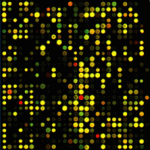Genomics
|
30 october 2014 23:53:27 |
| Genetic adaptation of the human circadian clock to day-length latitudinal variations and relevance for affective disorders (Genome Biology) |
|
Tweet Background:
The temporal coordination of biological processes into daily cycles is a common feature of most living organisms. In humans, disruption of circadian rhythms is commonly observed in psychiatric diseases, including schizophrenia, bipolar disorder, depression and autism. Light therapy is the most effective treatment for seasonal affective disorder and circadian-related treatments sustain antidepressant response in bipolar disorder patients. Day/night cycles represent a major circadian synchronizing signal and vary widely with latitude.
Results:
We apply a geographically explicit model to show that out-of-Africa migration, which led humans to occupy a wide latitudinal area, affected the evolutionary history of circadian regulatory genes. The SNPs we identify using this model display consistent signals of natural selection using tests based on population genetic differentiation and haplotype homozygosity. Signals of natural selection driven by annual photoperiod variation are detected for schizophrenia, bipolar disorder, and restless leg syndrome risk variants, in line with the circadian component of these conditions.
Conclusions:
Our results suggest that human populations adapted to life at different latitudes by tuning their circadian clock systems. This process also involves risk variants for neuropsychiatric conditions, suggesting possible genetic modulators for chronotherapies and candidates for interaction analysis with photoperiod-related environmental variables, such as season of birth, country of residence, shift-work or lifestyle habits. |
| 108 viewsCategory: Bioinformatics, Genetics, Genomics |
 Benchmarking mutation effect prediction algorithms using functionally validated cancer-related missense mutations (Genome Biology) Benchmarking mutation effect prediction algorithms using functionally validated cancer-related missense mutations (Genome Biology)Genomic mapping of the MHC transactivator CIITA using an integrated ChIP-seq and genetical genomics approach (Genome Biology) 
|
| blog comments powered by Disqus |
MyJournals.org
The latest issues of all your favorite science journals on one page
The latest issues of all your favorite science journals on one page



